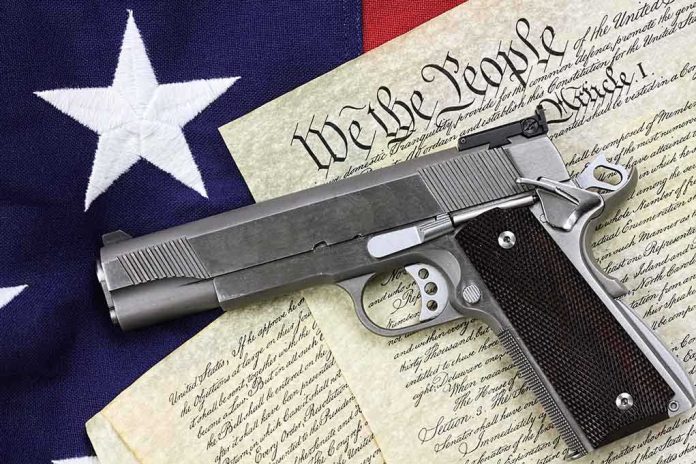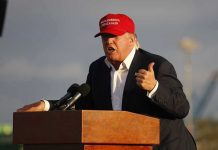
President Trump’s ambitious tax reform bill is poised to deliver a double victory for conservatives by slashing taxes and rolling back decades-old restrictions on gun silencers, short-barreled rifles, and shotguns.
Key Takeaways
- Trump’s tax reform bill aims to remove silencers from a 1930s law, eliminating a $200 tax and background check requirements
- The Senate version expands deregulation to include short-barreled rifles and shotguns
- Republicans frame the changes as protecting Second Amendment rights and gun owners’ hearing
- Democrats oppose the provisions, arguing they create public safety risks
- The bill is on track for potential July 4 approval, fulfilling multiple conservative priorities
Republican Tax Bill Targets Gun Regulation Rollbacks
The comprehensive tax reform package championed by President Trump and Republican leadership is advancing rapidly through Congress with additional provisions that would significantly ease regulations on firearms. The legislation targets specific restrictions in the National Firearms Act of 1934, which has regulated silencers, short-barreled rifles, and shotguns for nearly a century. If passed, these items would no longer be subject to the $200 tax stamp requirement and additional background checks that have long been criticized by gun rights advocates as burdensome and unnecessary constraints on lawful ownership.
Republican lawmakers have been clear about their intentions to protect what they view as constitutional rights while delivering on long-sought tax reform. The bill represents a significant shift in federal firearm policy, potentially removing hurdles that have restricted access to these firearms accessories and specialized weapons for decades. The provisions have broad support among Republicans who see an opportunity to deliver on multiple conservative priorities with a single piece of legislation. The inclusion of these gun rights provisions is expected to help secure necessary votes for the larger tax package.
GOP tax bill would ease regulations on gun silencers and some rifles and shotgunshttps://t.co/aeNAFfHT4b pic.twitter.com/QeRDloK10Y
— The Washington Times (@WashTimes) June 24, 2025
Silencer Deregulation Sparks Heated Debate
The proposal to remove silencers (also called suppressors) from the National Firearms Act has become one of the most contentious aspects of the bill. Supporters argue these devices primarily protect shooters’ hearing and have legitimate sporting purposes. Republican Rep. Andrew Clyde, a leading advocate for the provision, has emphasized the health benefits for gun owners. “Burdensome regulations and unconstitutional taxes shouldn’t stand in the way of protecting American gun owners’ hearing,” said Rep. Andrew Clyde.
Democrats have mounted strong opposition to the silencer provisions, with Senate Democratic Leader Chuck Schumer leading efforts to remove them from the bill through parliamentary review. “Parents don’t want silencers on their streets, police don’t want silencers on their streets,” said Senate Democratic leader Chuck Schumer, D-N.Y. Gun control advocates have also voiced concerns, suggesting that reducing regulations could create public safety risks by making it more difficult for law enforcement to respond effectively to shooting incidents.
GOP tax bill would ease regulations on gun silencers and some rifles and shotgunshttps://t.co/nsdmHuxQIh pic.twitter.com/fQvmfvSeek
— Josh Boak (@joshboak) June 23, 2025
Senate Expands Deregulation to Short-Barreled Weapons
The Senate version of the bill goes further than the House proposal by including provisions to deregulate short-barreled rifles and shotguns. This expanded approach has gained support from key Republican senators who view it as an opportunity to address multiple Second Amendment concerns at once. Texas Senator John Cornyn has been particularly vocal about his support for the broader deregulation effort and its alignment with President Trump’s legislative priorities for his new administration.
“I’m glad the Senate is joining the House to stand up for the Second Amendment and our Constitution, and I will continue to fight for these priorities as the Senate works to pass President Trump’s One Big Beautiful Bill,” said Texas Sen. John Cornyn.
The proposed changes represent a significant departure from the bipartisan gun legislation passed in 2022, which increased background checks for younger buyers and expanded funding for mental health services. Unlike that compromise bill, the current provisions are advancing along partisan lines as part of a broader conservative legislative agenda. President Trump has set an ambitious timeline, aiming to have the complete tax and spending cuts package on his desk by July 4th, creating a symbolic Independence Day victory for his administration.
Safety Concerns Versus Constitutional Rights
Gun control organizations have expressed serious reservations about the proposed changes, arguing that they could increase risks to public safety and law enforcement. Everytown for Gun Safety, one of the most prominent gun control advocacy groups, has been particularly critical of the silencer provisions. “There’s a reason silencers have been regulated for nearly a century: They make it much harder for law enforcement and bystanders to react quickly to gunshots,” said John Feinblatt, president of Everytown for Gun Safety.
Republicans counter these concerns by emphasizing that silencers don’t silence firearms completely, but rather reduce sound levels to protect hearing. They also note that even with these changes, purchasers would still need to pass standard background checks required for any firearm purchase. The tax bill would maintain existing gun regulations while removing what conservatives view as an unnecessary and unconstitutional tax burden and extra regulatory layer that has been in place since the 1930s. The timing of this legislation represents a swift move to deliver on campaign promises to both cut taxes and protect Second Amendment rights.






